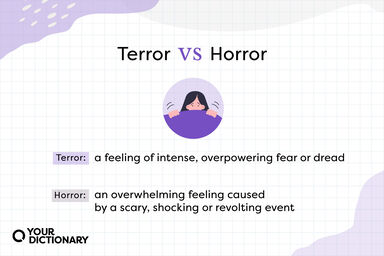Fear Definition
- concern
- care
- veneration
- reverence
- awe
- fearfulness
- fright
- weakheartedness
- milksoppiness
- aversion
- scare
- dismay
- consternation
- funk
- panic
- in order to avoid or prevent; lest
Idioms, Phrasal Verbs Related to Fear
Origin of Fear
-
From Middle English feer, fere, fer, from Old English fǣr, ġefǣr (“calamity, sudden danger, peril, sudden attack, terrible sight”), from Proto-Germanic *fērą (“danger”), from Proto-Indo-European *per- (“to attempt, try, research, risk”). Cognate with Dutch gevaar (“danger, risk, peril”), German Gefahr (“danger, risk, hazard”), Swedish fara (“danger, risk, peril”), Latin perīculum (“danger, risk, trial”), Albanian frikë (“fear,danger”).
From Wiktionary
-
From Middle English fere, feore, from Old English fēre (“able to go, fit for service”), from Proto-Germanic *fōriz, *fōrijaz (“passable”), from Proto-Indo-European *per- (“to put across, ferry”). Cognate with Scots fere, feir (“well, active, sound”), Middle High German gevüere (“able, capable, fit, serviceable”), Swedish för (“capable, able, stout”), Icelandic færr (“able”). Related to fare.
From Wiktionary
From Middle English feren, from Old English fǣran (“to frighten, raven”), from Old English fǣr, ġefǣr (“calamity, sudden danger, peril, sudden attack, terrible sight”). See above.
From Wiktionary
-
Middle English fer from Old English fǣr danger, sudden calamity per-3 in Indo-European roots
From American Heritage Dictionary of the English Language, 5th Edition
Related Articles
Find Similar Words
Find similar words to fear using the buttons below.





